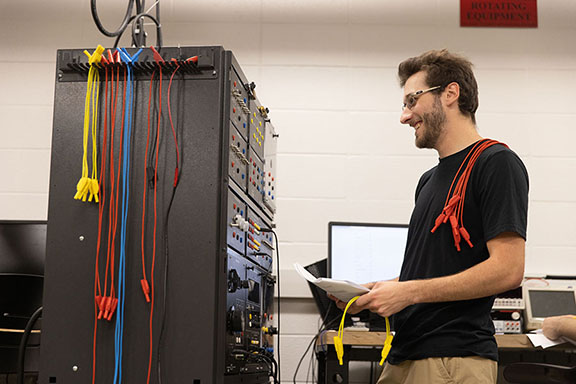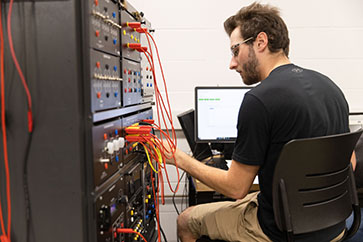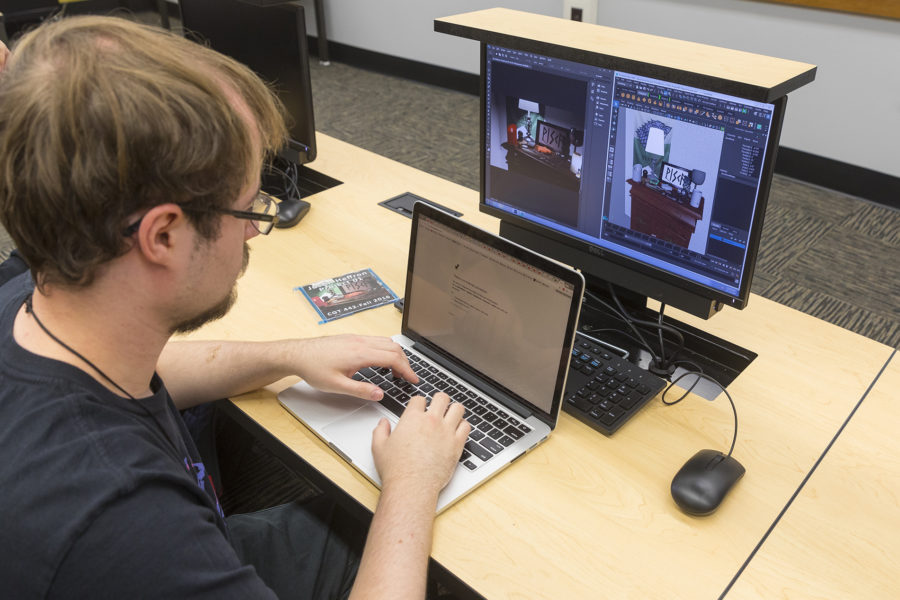
Bachelor's Degree in Computer Information Technology
Bachelor of Science
Request Information
Computer Information Technology Degree Program Overview
As a computer information technology major at Purdue University Northwest, you’ll take courses that span knowledge areas including computational thinking, programming, networking technologies, operating systems, information assurance, web systems technology and database design and implementation.
Our program will prepare you for a career in a variety of technology fields.
Department of Computer Information Technology and Graphics
Our faculty members have a wealth of real-world experience and are leaders in their respective disciplines.
You’ll benefit from their mentorship and training in real-life laboratories and other settings. It’s a comprehensive combination of theoretical and hands-on preparation for a career in the field.
Program Educational Objective One
The program will produce graduates that are information technologists with applied research, critical thinking and problem solving skills.
Program Educational Objective Two
The program will produce graduates that are professionals, leading industry direction with excellence in providing solutions to business needs.
Program Educational Objective Three
The program will produce graduates that are future information technology leaders.
Program Educational Objective Four
The program will produce graduates that are life-long learners who have a commitment to service within the community.
Program Educational Objective Five
The program will produce graduates that are citizens of the world, sensitive to state, national and global initiatives through technological solutions.
Graduates of the Computer Information Technology program will be able to (Learning Outcomes):
- Analyze a complex computing problem and to apply principles of computing and other relevant disciplines to identify solutions.
- Design, implement, and evaluate a computing-based solution to meet a given set of computing requirements in the context of the program’s discipline.
- Communicate effectively in a variety of professional contexts.
- Recognize professional responsibilities and make informed judgments in computing practice based on legal and ethical principles.
- Function effectively as a member or leader of a team engaged in activities appropriate to the program’s discipline.
- Use systemic approaches to select, develop, apply, integrate, and administer secure computing technologies to accomplish user goals. [IT]
Enrollment Trends and Graduation Data
| Year | Enrollment | Graduates |
|---|---|---|
| 2022-23 | 129 | 34 |
| 2021-22 | 166 | 34 |
| 2020-21 | 210 | 42 |
| 2019-20 | 226 | 31 |
| 2018-19 | 208 | 31 |
Computer Information Technology Degree Program Highlights
The program is hosted in a National Center of Academic Excellence in Cyber Defense Education, designed by the U.S. Department of Homeland Security and National Security Agency, with a special focus on Network Security Administration.
The designation symbolizes that our curriculum meets the national standard of cyber defense education.


Computer Information Technology Degree Program Outcomes
Through classroom and lab interaction with experienced faculty, applied research and experiential learning, you’ll begin your professional work with the confidence and knowledge to be successful in a dynamic, competitive field.
Computer Information Technology Degree Program Career Paths
This degree prepares you for a number of careers in the field, including:
- Software developer
- Web developer
- Mobile app developer
- Database analysts and developer
- Computer security specialist
Computer Information Technology Degree Program Beyond the Classroom
You’ll have many opportunities to get involved in on- and off-campus activities, including:
Computer Information Technology Degree Program Scholarships
There are a number of scholarships available for students in this program, including:
- John and Sam Maniotes Scholarship
- Department of Defense Cyber Scholarship Program
- Louis Stokes Alliance for Minority Participation Scholarship
- NSF CyberCorps Program
Computer Information Technology Degree Program Employers
Our alumni work with some of the most innovative organizations across the region and around the world, including:
- Community Healthcare System
- Arcelor Mittal
- NiSource
- Cerner Corporation
Computer Information Technology Degree Program Accreditation
The Computer Information Technology Bachelor of Science program is accredited by the Computing Accreditation Commission (CAC) of ABET, http://www.abet.org, under the commission’s General Criteria and Program Criteria for Information Technology and Similarly Named Computing Programs.
Meet the Faculty

Earn a Bachelor's Degree in Computer Information Technology at PNW
Purdue University Northwest’s computer information technology degree prepares students for careers in a variety of technology fields by building crucial programming and design skills.
To see how a bachelor’s degree in computer information technology opens doors, from corporate boardrooms to non-profit leadership, take the next step today!










